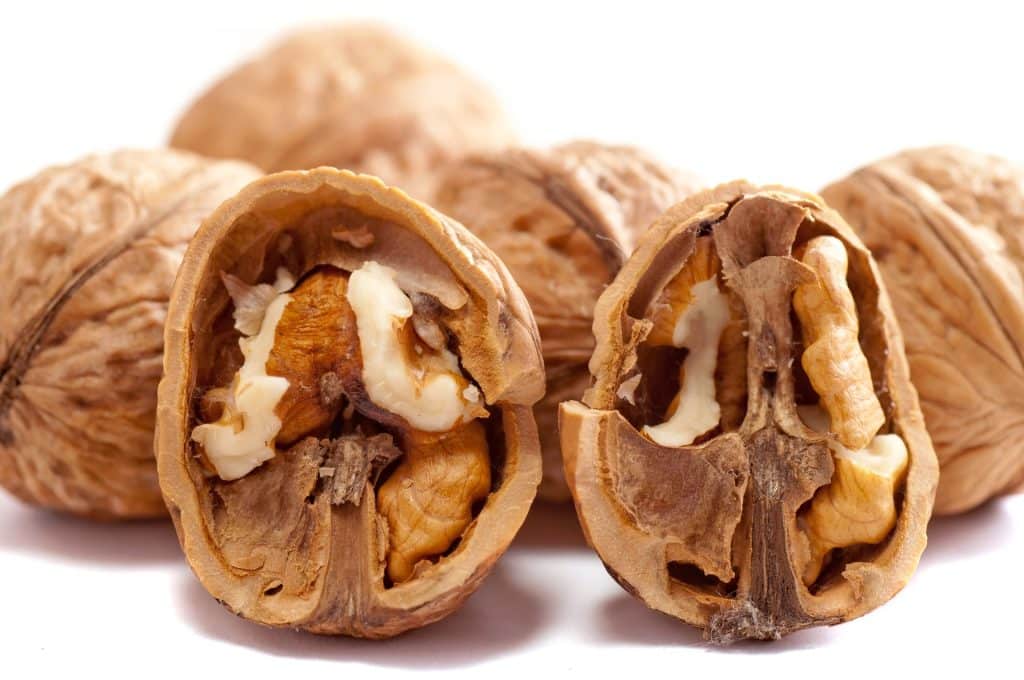Can Dogs Eat Walnuts? A Vet’s Opinion

Walnuts are a very nutrient-dense fruit. Compared to other standard nuts, they have considerably healthier omega-3 fats and higher antioxidant activity. But can you feed walnuts to your dog?
Walnuts can be hard for dogs to digest and may even pose health risks, so feeding them is usually not advised. Due to their high lipid and protein content, they may result in pancreatitis or other gastrointestinal problems. Moreover, toxic compounds called tremorgenic mycotoxins, which can inflict seizures and neurological symptoms in canines, can occasionally be found in walnuts. Identifying which walnuts are safe for dogs to eat can be challenging, so it’s best to avoid giving them walnuts entirely. Always consult with your veterinarian.
Benefits Of Walnuts For Dogs
While it’s true that some dogs may enjoy the flavor of walnuts, the possible dangers and gastrointestinal problems they could bring on typically exceed the advantages. In general, it’s best to steer clear of giving canines walnuts.
Nevertheless, if you’re still curious about the advantages of walnuts for canines, here are some of them:
Omega-3 Fatty Acids
Omega-3 fatty acids are essential for keeping healthy skin and fur and lowering inflammation. Walnuts are a good source of these acids. However, other omega-3 fatty acid sources, like flaxseed or fish oil, are safer and better for canines.
Anti-oxidants
- Antioxidants
Vitamin E and polyphenols, two antioxidants found in walnuts, can strengthen your dog’s immune system and guard against tissue deterioration. However, some foods, like blueberries, spinach, and sweet potatoes, have excellent antioxidant content and are better for dogs.
Protein
Walnuts are an excellent source of this essential nutrient for building and repairing muscles. Lean meats, eggs, and seafood are alternative protein sources better suited for dogs.
Brain Function
According to some research, walnuts’ high alpha-linoleic acid (ALA) concentrations may help dogs’ memory and cognition. More research is necessary to comprehend the potential advantages as these studies are small-scale completely.
Overall, despite the fact that dogs may benefit nutritionally from walnuts, the risks, and digestive problems they may pose usually exceed the advantages. It’s best to speak with your veterinarian and select foods, especially for canines, to add extra nutrients to your dog’s diet.

How To Safely Give Walnuts To Dogs
Typically, it is not advised to give canines walnuts as food. They may be hard to process, contain a lot of fat, and possibly harm your health. A poison known as tremorgenic mycotoxins, which can cause seizures and neurological symptoms in canines, may also be present in walnuts. It can be challenging to identify which walnuts are safe for dogs to consume, even though not all of them contain these toxins.
To reduce any possible risks, it’s crucial to take the following measures if you decide to continue feeding walnuts to your dog:
Start With Small Portions
Give your pup one or two tiny pieces—a very small amount—of walnuts to start. Keep an eye out for any symptoms of digestive upset in your dog, such as vomiting or diarrhea. Stop giving your dog walnuts right away if they start to respond poorly.
Select Fresh, High-Quality Walnuts
Look for walnuts in good condition, uncontaminated by mold or other contaminants, and untreated with pesticides or preservatives. Additionally, it’s best to stay away from salted or flavored walnuts because they might contain additional ingredients that are bad for canines.
Cut Or Grin Into Smaller Pieces
The best way to make walnuts easier for your dog to digest is to either grind them into a powder or chop them into tiny pieces. Additionally, it will help keep your canine from choking on more significant pieces.
Feed In Moderation
Even if your dog tolerates walnuts well, it’s still essential to only feed them occasionally. Overconsumption of walnuts may result in weight increase or digestive discomfort.
Consult Your Veterinary
Speaking with your veterinarian before introducing walnuts to your dog’s diet is always a good idea. They can advise you on safe feeding procedures and assist you in determining whether walnuts are suitable for your dog’s particular nutritional requirements.
Overall, even though giving small amounts of walnuts to dogs is possible, the possible dangers and digestive problems they may bring usually exceed the advantages. If you’re looking for wholesome treats for your dog, think about giving them lean meats, fruits, and veggies that are safe for dogs, or specially formulated dog treats.
Will Walnuts Make A Dog Sick?
Due to the fact that they can be challenging for canines to digest and may result in gastrointestinal problems, walnuts have the potential to make a dog ill. Due to their high lipid and protein content, walnuts can be difficult for a dog’s digestive system to process, which may result in pancreatitis or other gastrointestinal issues. Moreover, toxic compounds called tremorgenic mycotoxins, which can inflict seizures and neurological symptoms in canines, can occasionally be found in walnuts.
The following are a few signs of walnut poisoning in dogs:
- Vomiting
- Diarrhea
- reduced hunger
- frailty or sluggishness
- trembling or seizures
- Ineffective collaboration
- higher heartbeat
- Dehydration
It’s crucial to seek veterinary treatment right away if you think your dog may have consumed walnuts or is displaying symptoms of walnut toxicity. To assess the severity of the toxicity and offer the best course of therapy, your veterinarian might advise diagnostic procedures like imaging or blood work. Dogs should generally not be given walnuts because the potential risks and digestive problems they may bring usually exceed the advantages. If you’re looking for wholesome treats for your dog, think about giving them lean meats, fruits, and veggies that are safe for dogs, or specially formulated dog treats. It’s wise to counsel your veterinarian if you have any worries about the diet or health of your dog.
Can dogs eat walnut variations?
Any kind of walnut, including varieties like black walnuts, English walnuts, and Persian walnuts, shouldn’t generally be given to canines. Walnuts are not suitable food for most dogs, although some canines can handle small quantities without any issues due to several possible risks and digestive problems.
Walnuts should all generally be avoided, even though some varieties may have slightly varying nutrient profiles or levels of toxicity. If you’re looking for wholesome treats for your dog, think about giving them lean meats, fruits, and veggies that are safe for dogs, or specially formulated dog treats. It’s wise to counsel your veterinarian if you have any worries about the diet or health of your dog.

Vet’s Summary
The article explores the topic of dog walnut consumption. Even though walnuts have some nutrients that might be helpful for dogs, they can be hard to process and may lead to gastrointestinal issues. Furthermore, tremorgenic mycotoxins, which can be toxic to canines and result in seizures and other neurological symptoms, may be present in walnuts. It’s usually best to avoid giving walnuts to dogs, though some may be able to handle small amounts without any issues.
Giving your canine probiotic supplements may help if you’re worried about their digestive health. Probiotics are live microorganisms that can enhance digestion and promote a healthy gut microbiome. Dogs with digestive problems like chronic diarrhea or inflammatory bowel disease might be particularly beneficial. Before starting your canine on any new supplements, it’s crucial to select a high-quality probiotic supplement designed especially for dogs and to speak with your vet.
Videos To Watch
If you are wondering if you can give your dog walnuts, watch this:
And if you want to know what a dog can NOT eat, watch this:






